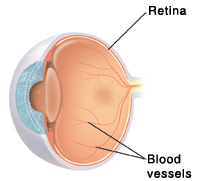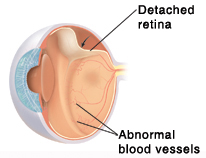Retinopathy of Prematurity (ROP)
Retinopathy of Prematurity (ROP)
Premature babies are at risk of ROP. This is a problem that can affect eyesight. ROP is the growth of abnormal blood vessels on the retina (lining of the back of the eye). In severe cases, the blood vessels can detach the retina from the back of the eye.
|
What causes ROP?
ROP occurs because the blood vessels on the retina are not finished growing until late in pregnancy. If a baby is born prematurely, these blood vessels aren’t fully developed at birth. So the blood vessels complete their growth after the baby is born. Factors in the environment outside of the womb may cause them to grow abnormally. One problem may be changing levels of oxygen in the blood. ROP is more likely in younger or smaller preemies.
How is ROP diagnosed and monitored?
All premature babies in the NICU (neonatal intensive care unit) have their blood oxygen levels closely monitored. Babies born less than 30 weeks gestation or weighing 1,500 grams or less are examined by an ophthalmologist (a healthcare provider who treats eye problems). Eye drops are used to dilate (expand) the pupil of the eye. This allows the healthcare provider to look through the pupil to check the blood vessels on the retina. If the healthcare provider sees abnormal blood vessels, the ROP is rated from stage 1 (mild) to stage 5 (severe). The location of the blood vessels is also noted. The first exam may be done around 4 to 6 weeks after birth. Depending on the results of this exam and the baby’s gestational age, follow-up exams are almost always necessary.
How is ROP treated?
Mild ROP (stages 1 and 2) often needs no treatment. Babies with moderate to severe ROP may need laser surgery. This treatment uses a laser to create small burns that make scar tissue. These scars seal the borders of the retina, slowing or reversing the abnormal growth of blood vessels and helping prevent detachment. Laser surgery is often effective. It is not likely to cause complications.
What are the long-term effects?
Many babies with ROP have no lasting effects. The more severe the disease, the higher the chance of permanent vision problems. The baby’s vision will most likely need to be evaluated within 6 months after leaving the hospital to see if glasses or eye exercises are needed. In rare cases, ROP can lead to blindness.
Updated:
January 20, 2018
Sources:
Up To Date. Retinopathy of Prematurity
Reviewed By:
Freeborn, Donna, PhD, CNM, FNP,Lee, Kimberly G., MD, MSc, IBCLC

